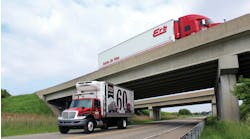As Arkansas goes, so goes the nation? Arkansas is being called 'ground zero' in the trucking industry's war against implementation of tolls on Interstate highways. At issue is the Arkansas Highway Commission's proposal to make that state the first in the nation to charge tolls on its Interstates, specifically I-30, I-40, and I-55. If approved, the tolls could collect about $80 million annually, with about $60 million of that total being paid by truckers. 'Some truckers are in denial, saying 'it can't happen.' But it could happen. It's a very real issue,' says Lane Kidd, president of the Arkansas Motor Carriers Assn., based in Little Rock.
What makes this particular proposal so significant is that Arkansas may be the perfect state to lead a nationwide charge. First, one of the stretches of highway suggested for toll plazas ' 120 miles of I-40 from Little Rock to Memphis ' is often the most heavily traveled Interstate in the country, carrying almost 13,000 trucks daily. This ensures massive revenue generation.
Second, Arkansas may be the easiest state in terms of its politics and industry to be the country's point state for Interstate tolls. No state legislative approval is needed under Arkansas law to implement tolls; the Highway Commission can do it unilaterally. Third, the state has a large number of trucking firms that can be tapped for revenue. 'We've become the cash for highways in Arkansas,' says Kidd. 'We're an easy target.' He estimates the new tolls could cost truckers $1 per axle and about 13 cents per mile.
Arkansas highway commissioners didn't come up with this plan on their own. Congress started the ball rolling when it passed the Transportation Equity Act for the 21st Century (TEA-21). The law mandated that up to three states could apply to DOT for permission to test tolls on their Interstate highways. By mid-December, the Arkansas Highway Commission was preparing its application simultaneous with DOT issuing an invitation to apply. According to observers, if the application is submitted, DOT will probably rubber stamp it, which leaves Kidd and critics to fight the matter in the Arkansas legislature. 'We will work to get the legislature to pass a resolution outlawing tolls,' he said. The legislature convenes on January 11.
Other states, including California, Pennsylvania, and South Carolina, have expressed interest in establishing tolls, and are closely watching the situation in Arkansas. 'States are looking at new revenue options,' says Taylor Bolding, vp-government policy affairs for the American Highway Users Alliance, a Washington, D.C.-based organization that opposes the toll plan. 'Our single most important argument against tolls is that this is a tax that highway users are already paying through fuel taxes. A toll is like paying rent on a house you already own.'
While TEA-21 allows up to three states to experiment with tolls, the law is quite specific. Tolls would be permitted where 'improvement costs exceed available funding sources and work cannot be advanced without' their collection. However, another provision of the law ' one that few have focused on ' allows tolls to be imposed for different reasons. The so-called 'value pricing project' would allow up to 15 states to collect tolls on Interstates in an effort to decrease congestion. The Federal Highway Administration has already issued a notice, but no states have yet applied. This provision brings the number of states that could begin collecting tolls on Interstates to 18.
Even if states don't initially seek tolls, they can use the threat to their advantage. In Arkansas, truckers are not only fighting potential tolls but a proposed 3 cents per gallon increase in diesel fuel taxes. Governor Mike Huckabee has already said he would ask the lawmakers to pass such legislation, which could net the state $2.3 billion. Other proposals are also expected to surface, including a 4.5 cents sales tax on motor fuel, a separate diesel tax of 5 cents to 7 cents, and a weight/ distance tax. 'We're fighting on several fronts,' said Kidd.
The best hope for truckers is to join forces with automobile drivers. Groups such as AAA of Arkansas have already voiced opposition to tolls, but motorist organizations could break ranks when it comes to increases on diesel fuel and weight/distance tax issues.
'Our challenge is to educate the legislature and the public that trucks are already paying their fair share,' says Kidd.
This becomes increasingly difficult since communities are now railing against truck noise, which could, ironically, be exacerbated if trucks migrate to local roads to avoid paying taxes on Interstates.
In addition, some states are singling out trucks because they believe they're not paying their fair share. In Maine, for instance, tolls for truckers on the state turnpike will increase 25% in February. Turnpike officials there, echoing their constituents, noted that the increase for commercial users was fair because trucks inflict more damage on roads than cars.
Hours of service The Federal Highway Administration (FHWA) is looking into the possibility of conducting a negotiated rulemaking to revise the drivers' hours-of-service rules. In a negotiated rulemaking, FHWA invites interested parties that are likely to be affected by a regulation to work with each other and the agency to develop a consensus draft of a proposed rule. That proposed rule would then be published by the agency for public comment under customary regulatory procedures. FHWA will continue to move forward with its traditional rulemaking until it decides whether to take this alternative route.
OSHA strikes again Look for OSHA to issue workplace safety and health rules that would require every employer ' including those in trucking ' to establish workplace safety and health programs. These programs would have to include management leadership and employee participation; hazard identification and prevention; training and periodic review.
Heavy breathing OSHA is not stopping there. The agency has issued new rules governing painting and refinishing that require, among other things, that shops have a respirator program administration, a written respirator program, proper maintenance of respirators, worker training, and tight fitting face-piece respirators. For more information, check out the agency's Web site: www.osha-slc.gov/OshStd_data/1910_ 0134.html.
Driving safely The Network of Employers for Traffic Safety has designated April 19-23, 1999, as the third annual National Drive Safely at Work Week. The public awareness campaign will focus on five key issues that cost employers a ton of money: occupant protection, impaired driving, aggressive driving, sharing the road, and driver inattention.
Maker says new Delo 400 formulation surpasses API CH-4 specs
Last month, Chevron Global Lubricants announced the national rollout of the latest reformulation of its Delo 400 Multigrade motor oil.
'This new generation of Delo 400 again shows Chevron's dedication to leading the industry,' said Peter McCrea, vp-lubricants division.
He stated that Chevron has found that because of higher soot levels, API CH-4 oils 'may not provide adequate protection for today's operating environments. We designed Delo 400 to protect engines from soot levels much higher than anticipated by CH-4.'
According to McCrea, use of new Delo 400 can reduce operating and maintenance costs by extending oil and equipment life.
Higher soot levels in crankcase oil, explained Jim McGeehan, engine oils technology manager, may result from recent EPA rulings that expand use of retarded injection timing.
'The Delo 400 oil we are now introducing,' McGeehan pointed out, 'satisfies the proposed 'PC-7.5' oil classification for the Year 2000 as well as OEM specifications. It is also well-positioned to exceed 'PC-9,' the 2002 category.'
Although demands on today's commercial-vehicle electrical system have increased dramatically as a result of higher horsepower engine environments and increased key-off loads, electrical-system evolution has not kept pace, according to engineers at Delco Remy America.
In a paper (SAE #982768) presented at the SAE International Truck & Bus Meeting in Indianapolis, they suggest that future alternators include not only all the features of today's units but have the following:
* Remote voltage sensing for more consistent charging of the battery;
* Voltage regulation compensated for battery temperature;
* Integral diagnostic capability, preferably interfaced with the data communications bus, as well as failure indication to the driver;
* Increased capability to monitor the electrical system, indicate faults, and take needed corrective action;
* Stationary mounting rather than swivel mounting to remove the belt-tensioning function from the alternator, and use of an automatic belt tensioner, thereby improving belt life, bearing life, and vibration tolerance;
* Expanded use of internal load-dump protection; and,
* Higher efficiency alternators to reduce fuel consumption.
Engineers from Leece-Neville noted in their paper (SAE #982765) that a microprocessor-based controller under consideration would tie together the alternator, starter, and battery.
Already 1999 is shaping up as a year for dramatic state tax proposals. Several states are considering major overhauls, including a proposed value-added tax in Montana and consolidation of unpopular separate business taxes into one comprehensive tax in West Virginia and elsewhere.
Quite a few states are likely to raise fuel taxes or registration fees in order to have enough money to match the federal dollars that have begun to flow from last year's Transportation Equity Act for the 21st Century, or TEA-21. Although not all the proposals will be enacted, a round of highway tax hikes would mirror what happened after federal highway taxes ' and grants to states ' climbed following the 1982 Surface Transportation Assistance Act.
Component maker buys Euclid Industries and LucasVarity's heavy brake business
Meritor Automotive, in moves to further strengthen its position in the global automotive original equipment and aftermarket segments, has announced the acquisitions of Euclid Industries and the Heavy Vehicle Braking Systems business of LucasVarity in two separate transactions. Meritor will pay $390 million in cash for the LucasVarity division. Terms of the Euclid agreement were not disclosed.
Headquartered in Cleveland, privately-held Euclid Industries is a leading supplier and manufacturer of more than 15,000 high-quality aftermarket replacement parts for heavy-duty trucks, trailers, tractors, school buses, and specialty vehicles. Its customers include more than 600 independent heavy-duty truck parts distributors in approximately 2,200 locations across the U.S. and Canada. Euclid generated sales of more than $100 million for its fiscal year ended August 31, 1998.
LucasVarity's heavy brake business includes air disc brakes, hubs, drums, and hydraulic brakes, and employs 1,800 people at seven production and technical facilities throughout North America and Europe. The brake division of LucasVarity reported sales of $290 million for 1997, split between Europe and North America. Meritor expects the purchase to add approximately $400 million in annualized sales to Meritor's revenues. The LucasVarity brake business will allow Meritor to support its European growth and its move toward disc brake technology.
The moves, both of which are subject to customary regulatory approvals, come on the heels of Meritor's acquisition of Volvo's heavy truck axle manufacturing operations for approximately $135 million in cash. Under terms of the agreement, Meritor will become the primary supplier of heavy-duty axles for Volvo's global heavy truck operations.
Meritor chairman and CEO Larry D. Yost said the actions 'reflect Meritor's commitment to offer our original equipment and aftermarket customers one of the most comprehensive product portfolios in the worldwide automotive components industry.
'The agreement to acquire Euclid Industries marks a significant step in Meritor's efforts to strengthen our profitable aftermarket business by adding a comprehensive offering of replacement components to Meritor's existing product lines, while it helps provide further balance against the cyclical impact of our served OEM markets.
Euclid Industries Chairman Raymond J. Zukowski said, 'I am confident that by combining Euclid's custom product solutions, state-of-the-art logistics and distribution systems, and industry-leading catalog with Meritor's strength in both its original equipment and aftermarket businesses, Meritor will create substantial growth opportunities now and in the future.'
Citing low demand for cabover products in North America, Navistar International Corp. plans to pull the plug on its International 9800 cabover trucks built at its plant in Springfield, Ohio, effective March 31, 1999, according to a company announcement.
The move, company officials noted, would free up capacity for production of other heavy-duty truck models with stronger demand. Navistar was building four cabovers a day at Springfield.
'Since 1977, the cabover segment of the heavy truck industry has declined by approximately 90%,' according to Steve Keate, vp and general manager of the company's heavy truck center. 'Exiting the 9800 model in North America will allow us to focus our resources on products that our customers demand.' He said that Navistar would still build the 9800 for export. Those trucks will be produced in Brazil.
The rate at which vehicle and component concepts become hardware continues to accelerate
Unfortunately, many of us have reduced the meaning of 'imagination' to fantasy or to playing with impossibilities. Rather, imagination is the capacity to embody the abstract in the concrete, to 'make an image' of what has previously existed only as a concept.
Nowhere was such imagination more evident ' at least as it applies to commercial vehicles and their operation ' than at the recent SAE International Truck & Bus Meeting in Indianapolis.
During the Chief Engineers Panel, subjects ranged from powertrains employing hybrid electric drives and fuel cells, and providing total energy management, to the total integration of vehicle control systems ' which all started out as standalone systems and are now connected by an electronic databus ' into an external vehicle-operating system, or traffic network.
One panelist noted that while the integration of mechanical systems ' engine, transmission, and axles ' was informal and fairly simple, integration of electronic components becomes far more complex and challenges both components suppliers and integrators.
In presenting the 43rd annual L. Ray Buckendale Lecture, Leonard C. Buckman, president and general manager of Meritor WABCO Vehicle Control Systems, stretched his audience's imagination by looking at the history, development, and future of braking systems 'from primitive systems such as rubbing a large block against the rim of a solid wheel to the development and continuing refinement of advanced, electronically controlled antilock, brake-by-wire, and vehicle-stability systems.
Such evolution, said Buckman, will accelerate. Trucks will operate 'in more crowded, environmentally conscious surroundings. Increased vehicle density will require new concepts of braking control, automatic speed control, active vehicle-collision-avoidance systems, automatic vehicle-spacing control, and similar advanced systems. Some of these systems are already in development; some are yet to be conceived,' he added.
'The complete elimination of air from commercial vehicle braking systems is a logical and necessary evolution . . . in order to take the next quantum step in braking,' according to Buckman, who predicted that 'cumbersome air compressors, reservoirs, air-processing products, air lines, and chambers will not be a part of the vehicle braking system of the 21st century any more than mechanical pedals and levers could meet the needs of our century.'
Touching upon the environment, Buckman said, 'Stopping a vehicle by converting its kinetic energy to heat and simply dissipating that heat to the atmosphere is wasteful . . . [and] in the future may even become an environmental concern. While this may seem far-fetched today, consider that the early designers of the combustion engine did not anticipate the actions that are now commonplace in controlling exhaust emissions. A practical, cost-effective means of regenerative braking must certainly be somewhere in the future.'
Summing up, this veteran of more than 35 years in brake design, engineering, and management said, 'Fifty years from now, our counterparts will look back at what we consider sophistication in braking and wonder how we got along with such a primitive system as air brakes with electronic control.
'The past years have been exciting and challenging for the brake engineer,' Buckman said, 'but the evolution is just beginning. The rate of change in the last ten years makes the previous ten years' pace look slow. The next ten years will be even faster and the years after that will make today's progress seem almost glacial.
'There will be no lack of challenges and opportunities for tomorrow's brake engineers. They must continue to find and develop technologies to meet the constantly changing needs of society,' Buckman concluded.


